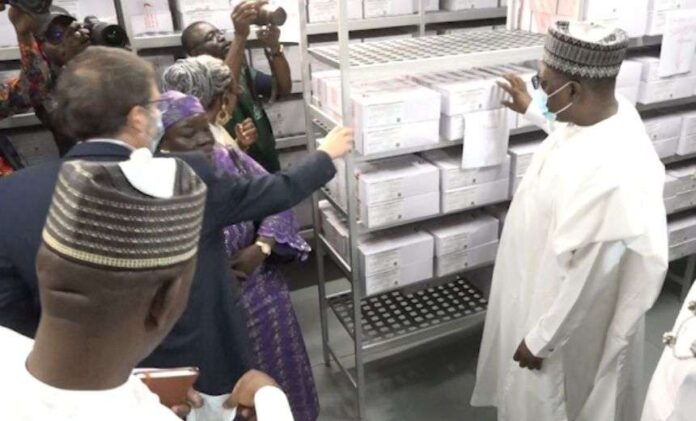*To begin vaccination in November in Bayelsa, Kebbi
CHIGOZIE AMADI
The federal government, Thursday, formally received one million doses of R21/Matrix-M Vaccine for malaria from Gavi.
The first phase of the vaccination will commence in November in two States – Kebbi and Bayelsa, with high prevalence of malaria, the government said.
Speaking at the formal handing over ceremony of the malaria vaccine to Nigeria by Gavi in Abuja on Thursday, Minister of Health and Social Welfare, Prof. Muhammad Pate, said the malaria vaccine is free, safe and efficacious.
He also assured that it is free at the point of use, adding that government and development partners in the Gavi Alliance are mobilizing the resources to provide vaccines.
“They are not enough vaccines. So, in the context of not enough vaccines, I want to urge all the Nigerians to take advantage of the limited availability and the fact that it’s available and bring their work to where they have the opportunity to make sure they are protected with these vaccines,” he said.
The Executive Director/CEO, National Primary Healthcare Development Agency (NPHCDA), Dr. Muyi Aina, said the vaccine will be administered to children aged 5 months to 15 months as part of Routine Immunization
He said that government is commencing the first phase of the introduction in November, in two states – Kebbi and Bayelsa, with high prevalence of malaria.
Aina said the arrival of the one million doses of the R21/Matrix-M vaccine from Gavi is a testament to President Bola Ahmed Tinubu’s commitment to protecting the lives of our citizens, particularly, children.
Nigeria is among the top ten contributors to the global burden of malaria, accounting for approximately 27 percent of the global burden and 31 percent of malaria deaths worldwide. In 2022, nearly 200,000 deaths from malaria occurred in Nigeria.
Children under five years of age, and pregnant women are the most affected, with a national malaria prevalence rate of 22 percent in children aged 6-59 months as of 2021.
However, the NPHCDA boss said the vaccine would quicken our malaria control and elimination efforts, adding that government is targeting about 13 percent reduction in all-cause mortality in children under five and a 22 percent reduction in hospitalized severe malaria cases.
Aina said that the World Health Organization (WHO) has recommended the prioritization of the vaccine in areas of high to moderate transmission.
According to Aina, the agency was being guided by WHO in embarking on a phased rollout of the malaria vaccine.
He said that the agency will be commencing the first phase of the introduction in November, in two States – Kebbi and Bayelsa, with high prevalence of malaria.
He said Kebbi currently has the highest prevalence rate in the country – Kebbi is 162,014 (52 percent); while Bayelsa is selected because its target population of 69,935, which aligns with the one million doses available for this phase.
His words: “The vaccine will be administered to children aged 5 months to 15 months as part of Routine Immunization. Each child requires four doses, given at 5, 6, 7, and 15 months of age, to be fully protected. The introduction will be expanded to other States and integrated into our national routine immunization schedule, as we receive additional doses.
“The second phase will target 19 States and FCT, while the third phase will target the remaining 15 States. Both phases are scheduled for 2025.”
To ensure a successful roll-out, Aina said that NPHCDA has established an elaborate cross program coordinating mechanisms that brings together key stakeholders and expertise in the malaria and immunization space at the national, and subnational levels.
In his remarks, the Country Director of the WHO, Walter Kazadi said that there is the need for more advocacy and enlightenment campaign among the citizens on the safety and efficacy of vaccines in the country.
























